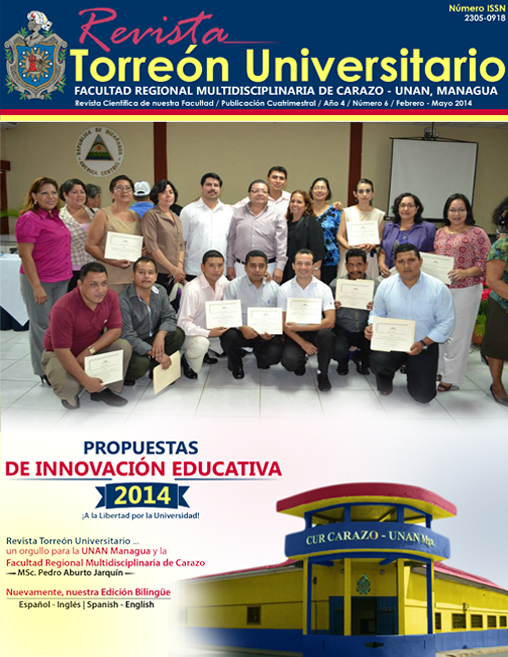Técnicas metodológicas para mejorar la pronunciación y fluidez del vocabulario del idioma inglés
Resumen
Los objetivos del presente trabajo es conducir una búsqueda educativa para mejorar la calidad de profesores, que debe ser el interés fundamental en el contexto de educación universitaria, el inglés es crucial para toda institución y organización que busca generar soluciones de conexión en el proceso de enseñanza-aprendizaje.
Con la transformación Curricular o reforma Universitaria se está rediseñando el currículum para afrontar retos en el mundo, la región, y Nicaragua en particular. En la mejora de Plan de Desarrollo Nacional de la enseñanza de la lengua inglesa en donde se contemplan las cuatro habilidades básicas del idioma como son:(escuchar, leer, escribir y hablar).
Descargas
Referencias
Hughes, R. (2002). El problema de discurso real. En C. N. Candlin& D. R. Sala (Eds.), Enseñando e investigando: Hablando (pp. 47-72). Londres: Pearson
Montoya, Un., & Villa, L. (2006). Radiofónico escolar. Bogotá: Paulinas: Centro de Comunicación Social.
Gros (2000.) Colaborative learning.
González, D.; Peirats, J.; Ventas, C.."Integración de las Tecnologías de la Información en las Organizaciones Educativas.". Virtual Educa 2002. III Conferencia Internacional sobre Educación, Formación, Nuevas Tecnologías y E-Aprendizaje.. Valencia, España . Junio 2002. CD.
Descargas
Publicado
Número
Sección
Licencia
Derechos de autor 2014 Universidad Nacional Autónoma de Nicaragua, Managua

Esta obra está bajo una licencia internacional Creative Commons Atribución-NoComercial-SinDerivadas 4.0.
The authors who publish in this journal agree to the following terms.
- The author or authors of the articles, essays or research grant the National Autonomous University of Nicaragua, Managua (UNAN-Managua) the editing rights (copyright) of the submitted work, therefore the University has the exclusive right to publish the article for the entire copyright period.
- These copyrights/authors authorize Torreón Universitario Magazine and the University to edit and disseminate/publish the article in said Magazine, including printed and electronic reproduction, storage, retrieval and any other type of publication, and sources of secondary information as services. of summaries and databases, they also empower it to protect the article against unauthorized use for dissemination by printed or electronic media (PDF, HTML, EPUB, XML or others).
License for use of content
The magazine uses the Creative Commons Attribution-NonCommercial-NoDerivs 4.0 International License.
Under this statement:

This journal is licensed under a Creative Commons Attribution-NonCommercial-NoDerivatives 4.0 International License. It can be copied, distributed and transmitted publicly as long as the author and source are cited (Revista Torreón Universitario), it should not be modified or used for any commercial purpose. The full license can be found at http://creativecommons.org/licenses/by-nc-nd/4.0/.



